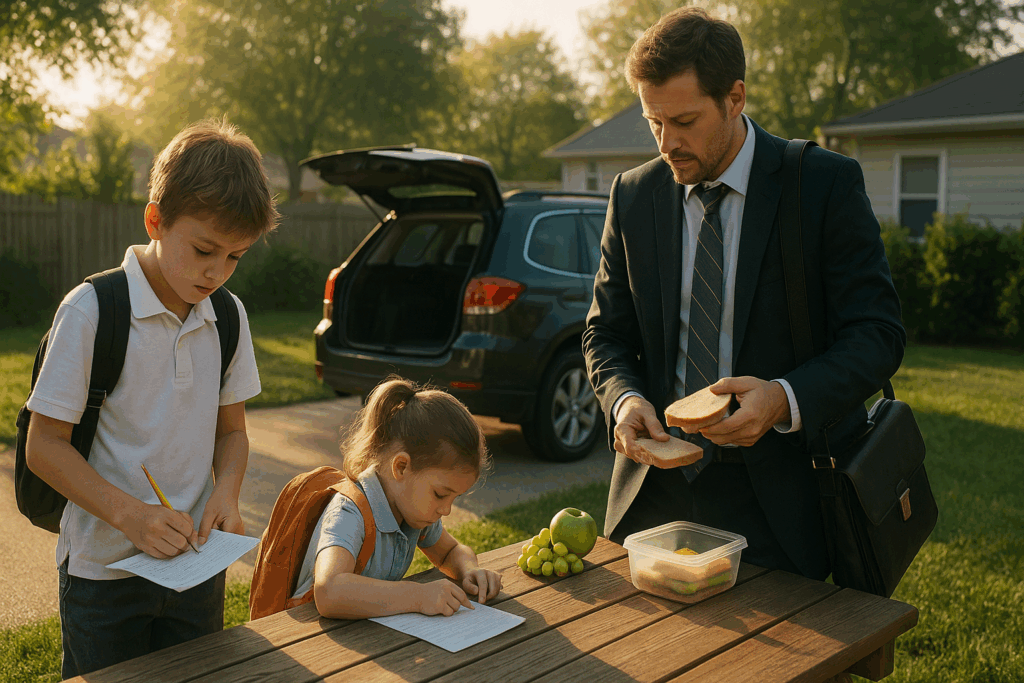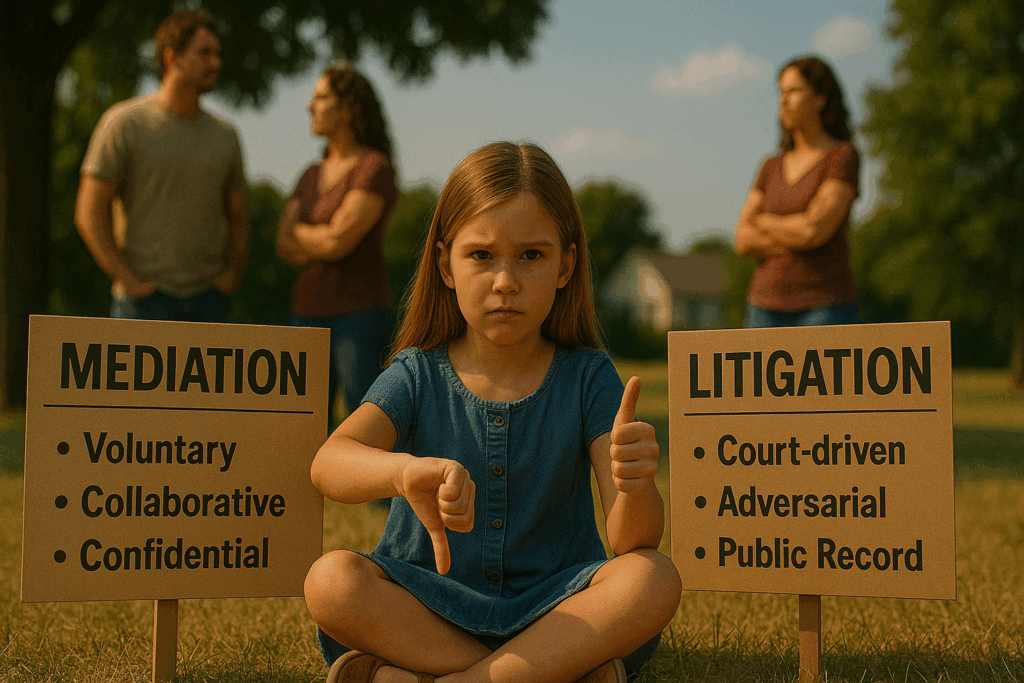
Ever had to explain long division while packing lunches, tying shoelaces, and getting to work on time—all while managing a custody exchange at 7:30 AM sharp? If that sounds familiar, you’re not alone. Modern parenting is a high-stakes juggling act, and when divorce or custody issues enter the picture, the pressure multiplies—especially for your kids. One of the biggest surprises for many parents is this: What they don’t tell you about Texas child custody is how much it can derail your child’s education if you’re not careful.
In this blog, we’ll pull back the curtain on a topic most custody guides barely mention—the quiet but powerful link between divorce, custody battles, and a child’s academic performance. Here’s the short answer: unstable schedules, tension between parents, and constant transitions can cause children’s grades to drop faster than a forgotten science project. But it doesn’t have to be that way.
Stick with us and you’ll get practical tips that you can start using today—from how to work with your child’s teachers during a custody case, to building co-parenting routines that keep homework on track no matter which house they’re sleeping in. We’ll also unpack legal strategies that most families never hear about until it’s too late—like how Texas courts factor in school stability when deciding custody, and how experienced family law attorneys can help protect your child’s learning environment through smart parenting plans and support agreements.
At The Law Office of Bryan Fagan, PLLC, our mission is simple: educate families and protect futures. So, let’s dive into what really matters—and what no one else is telling you—about custody, kids, and keeping that report card on track.
Key Takeaways
- Custody battles can have significant emotional impacts on children, making it crucial for parents to shield them from conflict and maintain positive relationships.
- Understanding the legal principle of ‘best interests of the child’ is essential, as courts may consider various factors that differ from parental expectations in custody cases.
- Documentation and effective communication are vital for successful custody outcomes, as they establish parental commitment and credibility while navigating legal processes.

Secure Your Child’s Future—Start Today
Don’t face custody challenges alone. Schedule your consultation now with a trusted Texas family law attorney and gain the clarity, support, and legal protection your family deserves.
The Hidden Emotional Toll of Custody Battles
One of the most overlooked realities in custody cases—and what they don’t tell you about Texas child custody—is the emotional toll these disputes take on children. As we’ve seen in our work with Texas families, kids often internalize conflict, leading to anxiety, depression, or sudden behavioral shifts like withdrawal or aggression. Under Texas Family Code § 153.002, the child’s best interest is the guiding principle in any conservatorship determination, yet emotional well-being is frequently eclipsed by legal positioning and parental conflict.
Our family law team frequently reminds parents that shielding children from litigation stress is critical. Involving them in adult conversations about custody can result in guilt, confusion, and long-term damage to their emotional development. The latest revisions to Texas Family Code § 153.371 further emphasize a child’s psychological safety, especially in high-conflict scenarios. Encouraging positive connections with both parents—when appropriate—not only aligns with the law but also fosters the kind of stability children need during uncertain times.
Parents must also be aware of how their own conduct can directly impact their custody case. Posting negative comments about the other parent online, exposing children to arguments, or engaging in parental alienation can all undermine credibility and violate the spirit of cooperation courts prefer to see. For actionable steps on how to avoid these pitfalls, we encourage reviewing this article on how to prepare for your Texas custody suit, which outlines practical, legally sound strategies.
At The Law Office of Bryan Fagan, PLLC, our legal professionals have helped many clients understand the emotional and legal nuances of custody. Whether it’s supporting a healthier co-parenting relationship or guiding clients through the courtroom process, our goal is to protect your child’s emotional health while safeguarding your parental rights. Learn more by visiting our resource on common mistakes to avoid in Texas child custody cases and let our family law team help you protect what matters most.

The True Meaning of “Best Interests of the Child”
The legal principle of the “best interests of the child” is central to Texas courts in child custody cases. This principle guides decisions on conservatorship, visitation, and child support, ensuring that the child’s emotional well-being and safety are prioritized. Judges assess various factors to determine the child’s best interest, including:
- The child’s emotional needs
- The child’s physical needs
- Financial stability
- A stable home environment
However, the court’s definition of “best interests” isn’t always what parents expect. Judges can utilize additional factors beyond established standards and may presume that parents should be named joint managing conservators unless proven otherwise, sometimes requiring court intervention. Understanding this legal principle and how it is applied can help parents navigate their custody battles more effectively.
Joint Custody Misconceptions
One of the most common misconceptions surrounding joint custody is the belief that it automatically guarantees a 50/50 split in parenting time. In reality, what they don’t tell you about Texas child custody is that joint managing conservatorship, as outlined in Texas Family Code § 153.131, refers primarily to shared rights and responsibilities—not necessarily equal time with the child. As we’ve seen in our work with Texas families, this misunderstanding can create unnecessary conflict and disappointment during the custody process. Joint custody focuses on collaborative decision-making regarding the child’s education, healthcare, and overall welfare, even if one parent has the exclusive right to determine the child’s primary residence.
The emotional and psychological benefits of both parents being involved in a child’s life are well-documented. However, successful joint conservatorship depends on the parents’ ability to communicate and cooperate effectively. Even when physical possession is not equal, maintaining meaningful contact with both parents can greatly benefit the child’s well-being. The recent updates to Texas Family Code § 153.134 reinforce the state’s preference for preserving ongoing and positive relationships with both parents, provided it is in the child’s best interest.
According to our family law team, setting clear expectations early in the process helps reduce confusion and tension between co-parents. Understanding the nuances of conservatorship and the decision-making authority each parent holds is essential to crafting a parenting plan that works in practice—not just on paper. For a deeper dive into how judges evaluate custody using the Holley factors, we recommend reviewing this guide on understanding Texas custody and the Holley factors, which breaks down each factor considered in determining the child’s best interest.
Our legal professionals have helped many clients understand how to approach joint custody with realistic expectations and a clear legal strategy. For additional insight into conservatorship, possession schedules, and co-parenting success, visit our internal resource on what to know about joint custody in Texas. At The Law Office of Bryan Fagan, we remain committed to educating families and protecting futures—every step of the way.

The Impact of Temporary Orders
Temporary custody arrangements are essential for ensuring the child’s welfare while legal disputes and court proceedings are ongoing in a child custody case. Judges base these decisions on factors such as the child’s age, stability, and existing parent-child relationships. The initial custody hearing allows both parents to present their cases, helping the court decide on a custody arrangement through temporary court orders. These orders remain effective until the court issues a new order or the case reaches a final resolution.
Temporary orders can have long-lasting effects on the final outcome of a custody case. Modifying a temporary order requires filing a Motion to Modify, which the court evaluates based on changed circumstances. Understanding the importance and potential impact of temporary orders can help parents navigate the custody process more effectively.
The Importance of Documentation
Documentation plays a critical role in child custody cases by providing necessary evidence for evaluations. Essential types of documentation include parenting journals, communication records, and incident reports. Well-organized documentation allows the court to easily comprehend the context and relevance of the presented information, significantly influencing custody decisions.
Consistent record-keeping can establish a parent’s credibility and commitment to their child’s welfare. Keeping detailed records of finances, medical care, and educational involvement is essential for building a strong custody case and demonstrating physical possession. Parents should understand that documentation and consistency can outweigh emotional arguments in court.
Social Media Pitfalls
In today’s digital age, social media activity can play an unexpected and often underestimated role in custody litigation. What they don’t tell you about Texas child custody is how even a single post—made in frustration or without legal awareness—can significantly impact a parent’s credibility in court. As our attorneys frequently advise, judges closely examine each parent’s willingness to cooperate and promote a healthy co-parenting relationship. Under Texas Family Code § 153.003, courts are prohibited from discriminating based on marital status, gender, or financial means, but that impartiality does not extend to behavior that reflects poorly on parental judgment, especially when it’s publicly displayed online.
Posting negative or threatening content about the other parent, venting about the custody case, or sharing private family matters on social platforms can be used as evidence to question a parent’s stability, maturity, and commitment to their child’s best interest. The most recent updates to Texas Family Code § 153.004 emphasize protecting children from emotional harm and parental conflict, which includes digital hostility. Maintaining composure not just in court but also online is essential. Parents who demonstrate restraint and civility are more likely to be seen as aligned with the child’s emotional safety and overall well-being.
Privacy settings are also critical. Our legal professionals have helped many clients understand the importance of limiting public visibility on social media accounts and avoiding impulsive posts. Monitoring the opposing party’s online behavior may also provide legally useful insight—without engaging in retaliation. These digital footprints can illustrate a pattern of conduct that either strengthens or weakens a custody claim, depending on how responsibly each parent presents themselves.
For a deeper look at how courts evaluate the child’s best interest and what behaviors support or undermine that goal, we recommend reading this guide on top considerations for determining the best interest of the child in Texas custody cases. Additionally, our resource on how social media can affect your custody case offers further guidance on navigating these sensitive issues. At The Law Office of Bryan Fagan, PLLC, we believe in preparing our clients with the legal insight—and digital awareness—needed to protect their families and their futures.

False Allegations and Their Consequences
False allegations in custody cases can significantly affect the court’s view of a parent, impacting custody decisions. Texas courts may implement temporary restrictions on parenting time if false allegations are raised. Psychological evaluations can provide objective assessments that help to counter severe false allegations. Taking legal action against malicious false claims can be necessary to safeguard one’s parental rights.
Responding impulsively to false accusations can undermine a parent’s credibility in court. Addressing false accusations promptly is crucial to protecting parental rights and ensuring a fair custody process. Effective documentation can serve as a strong rebuttal against any false allegations made during custody disputes. Gathering evidence such as communication records is critical to countering false claims.
Key strategies for effectively navigating false allegations in custody cases include:
- Legal representation is vital.
- Maintaining respectful communication with the ex-partner to avoid worsening the custody situation.
- Gathering witness statements from credible sources to strengthen a parent’s defense.
- Proper documentation to refute false accusations and demonstrate parental capability.
Mediation vs. Litigation
What they don’t tell you about Texas child custody is that most cases don’t end in dramatic courtroom battles—they’re resolved through mediation. As our attorneys frequently advise, mediation allows parents to retain control over custody outcomes, encouraging solutions tailored to their family’s needs rather than leaving those decisions solely to a judge. Mediation tends to be more cost-effective, private, and quicker than litigation, offering flexibility the courtroom often cannot. According to Texas Family Code § 153.0071, mediation is not only encouraged but frequently court-ordered as a first step toward resolution, especially when both parties are capable of cooperating in good faith.
That said, mediation isn’t always ideal for every case. In situations involving domestic violence, substance abuse, or extreme hostility, litigation may be the only safe and appropriate route. Under the updated Texas Family Code § 153.004, courts must consider any history of family violence or abuse when determining custody, reinforcing the need for judicial oversight in high-conflict cases. Litigation provides structured legal protections and a definitive ruling when parents cannot agree. Understanding these distinctions helps parents choose the path that best safeguards their child’s well-being while protecting their own rights.
For a clearer picture of custody outcomes and how judges typically decide these cases, we recommend reading this guide on who wins most custody battles in Texas. You can also explore our internal article on the benefits of mediation in Texas family law to help you prepare for whichever route may lie ahead. At The Law Office of Bryan Fagan, PLLC, we’re here to help you make informed, strategic decisions that protect your child—and your future.

The Child’s Preference in Custody Decisions
What they don’t tell you about Texas child custody is that while a child’s preference may carry some weight in court, it is never the deciding factor. According to Texas Family Code § 153.009, a judge must interview a child aged 12 or older in chambers if requested, but the child’s opinion is only one part of a much larger picture. As our attorneys frequently advise, Texas courts are ultimately guided by the child’s best interests—not just their wishes. Emotional well-being, safety, and stability are paramount, and a child’s stated preference must be evaluated in light of the overall circumstances of each parent.
The updated Texas Family Code continues to prioritize child safety under § 153.004, which requires courts to consider any evidence of abuse, neglect, or family violence when determining custody. A child’s input cannot override red flags or unfit parenting environments. This is why our legal professionals work closely with clients to understand not only the legal process but also the psychological factors that may influence a court’s decision. Managing expectations around primary custody and visitation is crucial—judges are careful not to place emotional pressure on children or reward preferences shaped by manipulation or conflict.
For a real-life account of how our firm navigates the complexities of these cases, we encourage you to read Morganne’s testimonial about her child custody experience. Her story illustrates the compassionate and strategic support families can expect from our team. To learn more about how a child’s voice fits into the broader legal framework, visit our article on how children’s preferences affect Texas custody cases. At The Law Office of Bryan Fagan, PLLC, we remain committed to guiding parents through emotionally charged custody decisions with clarity, compassion, and a firm understanding of Texas law.

Modifying Custody Orders
When one parent seeks to modify a custody order, they must file a petition for modification with the court. If a modification suit affecting a parent is filed, they need to respond appropriately to protect their rights. Texas provides specific forms and resources to assist parents in the modification process, including response kits for modification suits.
The Texas Family Code outlines the legal process and grounds for adjusting custody, visitation, or support orders. In Texas, modifications to a custody order generally require filing with the texas family courts after waiting a year, unless specific circumstances allow for earlier requests. Modification of orders is possible but requires substantial evidence and a clear legal strategy in Texas family law.

Practical Advice for Custody Preparation
Detailed records of finances, medical care, and educational involvement are crucial for a strong legal custody case. Knowledge of Texas custody laws is crucial for effective case preparation. An experienced custody lawyer ensures compliance with Texas laws and strengthens a parent’s case while also considering the potential impact of parent’s legal fees.
A well-structured parenting plan that outlines visitation schedules and decision-making responsibilities is favored by the court. Restricting a parent’s access due to conflict is counterproductive; working together puts children’s needs first. Parenting plans should be developed collaboratively to ensure the best outcomes for children.
Preparing for a custody evaluation involves:
- Maintaining a welcoming home
- Being cooperative with the evaluator
- Anticipating counterarguments from the other parent
- Preparing responses to those counterarguments to strengthen your custody claim.
Client Stories: Navigating Tough Realities
Navigating custody disputes can present significant emotional challenges for parents and children, often leading to unexpected stress and distress. Testimonials from clients of the Law Office of Bryan Fagan highlight their ability to tackle the complex emotional realities inherent in custody cases. Clients emphasize the importance of effective communication and legal advice in making informed decisions throughout the custody process in family court.
The Law Office of Bryan Fagan has a proven track record of helping clients navigate challenging custody situations, assuring that unspoken difficulties are addressed. These stories provide a human touch to the legal complexities, showing that with the right support, parents can successfully navigate the tough realities of custody battles with the guidance of a family law attorney.
How the Law Office of Bryan Fagan Can Help
Many clients highlight the law office’s experience in handling complex custody arrangements. The Law Office of Bryan Fagan specializes in navigating the complexities of child custody cases. The experienced attorneys at the Law Office of Bryan Fagan can help parents face what they don’t tell you about Texas child custody, providing both legal strategies and emotional support.
The firm’s approach not only emphasizes legal counsel but also considers the emotional and psychological well-being of clients during the custody process. By offering a holistic approach, the Law Office of Bryan Fagan ensures that parents are well-equipped to handle the multifaceted challenges of child custody battles.
Conclusion:
Custody battles don’t just live in courtrooms—they show up in backpacks, bedtime routines, and report cards. If you’ve made it this far, you already care deeply about how your decisions today shape your child’s tomorrow. And that’s exactly the kind of parent your child needs right now.
The truth is, school success doesn’t come from perfect test scores or color-coded calendars—it comes from stability, support, and two parents doing their best in a tough situation. Whether you’re navigating joint custody, drafting parenting plans, or wondering how to keep the school year on track across two homes, the decisions you make today can protect your child’s learning, confidence, and peace of mind for years to come.
You don’t have to figure this all out alone. The experienced team at The Law Office of Bryan Fagan, PLLC is here to help you create custody solutions that work in real life—not just on paper. Because raising thriving kids after a divorce isn’t just about legal wins—it’s about showing up where it matters most: in the classroom, at home, and in your child’s heart.
So take a deep breath, grab that school supply list, and know that support is just a call away. After all, parenting is hard enough—custody shouldn’t make it harder.
Frequently Asked Questions About Texas Child Custody
What not to say during a custody battle?
Avoid saying anything negative about the other parent, admitting to violating court orders, or expressing that you’re seeking custody out of revenge. Statements that suggest you’re unwilling to co-parent or put the child’s needs first can significantly harm your case.
What do judges look for in child custody cases Texas?
Judges in Texas evaluate what is in the best interest of the child. They consider factors like emotional and physical needs, parental stability, each parent’s involvement, and the ability to co-parent. They may also consider the child’s preference if the child is 12 or older.
What not to say in child support court?
Don’t claim you can’t pay child support without strong financial proof, and never suggest that your child doesn’t need support. Avoid blaming the other parent or making emotional outbursts—focus on clear, factual financial documentation.
What not to do in a custody battle Texas?
Don’t violate court orders, involve your child in adult conflicts, or disparage the other parent. Avoid social media rants and missing scheduled visitations. These actions can reflect poorly on your parenting and influence the judge’s decision.
What is the biggest mistake in custody battle?
The biggest mistake is focusing more on winning against the other parent rather than doing what’s best for the child. Judges can sense when a parent’s motives are not child-centered, which can hurt their credibility and case.
What words should you avoid in mediation?
Avoid using confrontational language like ‘always,’ ‘never,’ or ‘you did this.’ Instead, focus on collaborative, child-focused solutions. Mediation is about compromise, not blame.
What looks bad in a custody battle?
Things that look bad include inconsistent parenting, hostile communication, refusal to cooperate with the other parent, and poor judgment (e.g., substance abuse or criminal behavior). A lack of involvement in the child’s life also weakens your position.
What deems a parent unfit in Texas?
A parent is deemed unfit if they pose a danger to the child’s physical or emotional welfare. This includes abuse, neglect, substance abuse, mental instability, or inability to provide a safe and stable environment.
What questions would a judge ask a child in a custody case?
Judges may ask about the child’s routine, which parent helps with homework, where they feel most comfortable, and their relationship with each parent. These questions are asked in private and designed to assess the child’s well-being—not to make the child choose sides.
Bryan Joseph Fagan is a respected child custody attorney based in Houston, Texas, with deep roots in Atascocita. As the first lawyer in a close-knit family that includes two adopted brothers, Bryan brings a personal connection to every family law case he handles. His early caregiving experience—supporting his grandmother through Alzheimer’s while attending night school at South Texas College of Law—shaped his unwavering commitment to helping families through life’s toughest transitions.
Now a father of three, Bryan’s real-world parenting perspective enhances his legal insight. He leads one of the most dynamic family law teams in Texas, with a particular focus on child custody, visitation rights, and protecting parental rights. From hotly contested custody battles to amicable co-parenting arrangements, Bryan and his team understand that at the heart of every case is a child who deserves stability, safety, and love.
As a certified member of the College of the State Bar of Texas, Bryan holds himself to the highest standards of legal excellence and continuing education. He is known for crafting innovative, effective legal strategies that reflect both the letter of the law and the emotional realities families face.
Bryan’s practice spans every aspect of Texas family law, including:
Custody and visitation disputes
Modifications and enforcement of existing orders
Complex divorce proceedings involving children
Adoption and paternity cases
Marital property agreements
Defense against false CPS allegations
Bryan is also an active member of the Houston Bar Association’s Family Law Section and participates in statewide legal groups committed to improving outcomes for Texas families. Whether negotiating a peaceful custody agreement or litigating in court to protect a child’s best interests, Bryan Joseph Fagan is a fierce advocate for parents and children across Texas.



